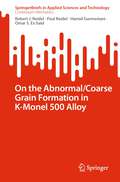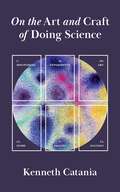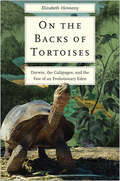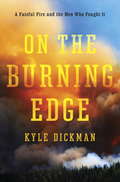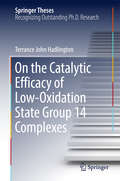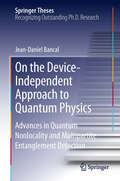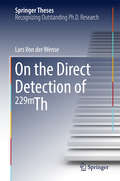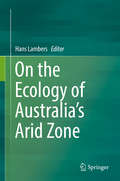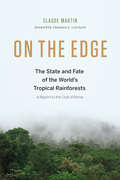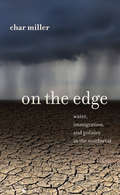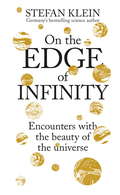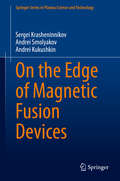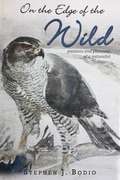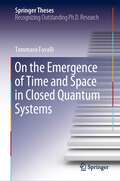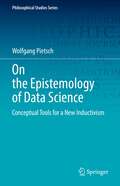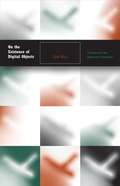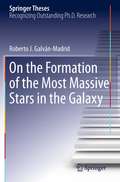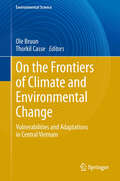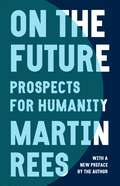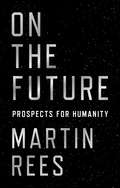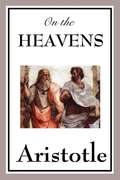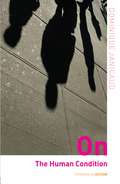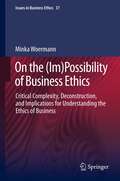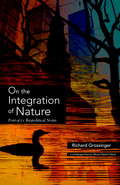- Table View
- List View
On the Abnormal/Coarse Grain Formation in K-Monel 500 Alloy (SpringerBriefs in Applied Sciences and Technology)
by Robert J. Reidel Paul Reidel Hamid Garmestani Omar S. Es-SaidThis book helps unlock the root cause of abnormal grain growth in a commercial nickel alloy. The chapters explore the effects of different solution treating and aging techniques, showing how they impact the hardness properties of hot-rolled and cold-drawn Monel K-500. The book covers how high-frequency induction heat treating can lead to severe duplex microstructure, and uncovers the surprising differences between solution treating in vacuum and convection air furnaces. This book is helpful to anyone seeking to optimize the performance of metal alloys.
On the Art and Craft of Doing Science
by Kenneth CataniaA scientist&’s personal reflections on how to harness creativity and curiosity to generate new ideas and discover the unexpectedLike any creative endeavor, science can be a messy and chaotic affair. On the Art and Craft of Doing Science shares the creative process of an innovative and accomplished scientist, taking readers behind the scenes of some of his most pioneering investigations and explaining why the practice of science, far from being an orderly exercise in pure logic, is a form of creative expression like any other art.Kenneth Catania begins by discussing how ideas set the stage for scientific breakthroughs and goes on to describe ways to approach experimental design. He sheds light on the importance of art in making discoveries and demonstrates how to find and tell a compelling story about a scientific result while accurately communicating its findings. What role does failure play in science? Is it possible to fail better? How do you define success? Catania provides insights to these and other questions, along the way sharing the lessons he&’s learned from diverse figures ranging from science philosopher Thomas Kuhn to novelist Stephen King.Blending illuminating historical examples with insights from Catania&’s own groundbreaking research in biology and neuroscience, On the Art and Craft of Doing Science draws parallels with art and writing to reveal the creative side to the practice of good science.
On the Backs of Tortoises: Darwin, the Galapagos, and the Fate of an Evolutionary Eden
by Elizabeth HennessyAn insightful exploration of the iconic Galápagos tortoises, and how their fate is inextricably linked to our own in a rapidly changing world. Finalist for the 2020 E.O. Wilson Literary Science Writing Award, sponsored by PEN America Literary Awards The Galápagos archipelago is often viewed as a last foothold of pristine nature. For sixty years, conservationists have worked to restore this evolutionary Eden after centuries of exploitation at the hands of pirates, whalers, and island settlers. This book tells the story of the islands&’ namesakes—the giant tortoises—as coveted food sources, objects of natural history, and famous icons of conservation and tourism. By doing so, it brings into stark relief the paradoxical, and impossible, goal of conserving species by trying to restore a past state of prehistoric evolution. The tortoises, Elizabeth Hennessy demonstrates, are not prehistoric, but rather microcosms whose stories show how deeply human and nonhuman life are entangled. In a world where evolution is thoroughly shaped by global history, Hennessy puts forward a vision for conservation based on reckoning with the past, rather than trying to erase it. &“Fresh, insightful . . . Hennessy&’s melding of human and natural history makes for thought-provoking reading.&” —Booklist (starred review) &“Gripping . . . well-researched and thought-provoking . . . whether you&’re well-versed in the intricacies of conservation or have only just begun to long for a look at the tortoises yourself. On the Backs of Tortoises is a natural history that asks important questions, and challenges us to think about how best to answer them.&” —Genevieve Valentine, NPR &“Wonderfully interesting, informative, and engaging, as well as scholarly.&” —Janet Browne, author of Charles Darwin: Voyaging and Charles Darwin: The Power of Place
On the Burning Edge: A Fateful Fire and the Men Who Fought It
by Kyle DickmanIn the tradition of Sebastian Junger's The Perfect Storm and Robert Kurson's Shadow Divers comes a true and heartbreaking tale of courage, difficult decisions, and ultimate sacrifice. On the Burning Edge, by award-winning journalist and former wildland firefighter Kyle Dickman, is the definitive account of the Yarnell Hill Fire. On June 28, 2013, a single bolt of lightning sparked an inferno that devoured more than eight thousand acres in northern Arizona. Twenty elite firefighters--the Granite Mountain Hotshots--walked together into the blaze, tools in their hands and emergency fire shelters on their hips. Only one of them walked out. Dickman brings to the story a professional firefighter's understanding of how wildfires ignite, how they spread, and how they are fought. He understands hotshots and their culture: the pain and glory of a rough and vital job, the brotherly bonds born of dangerous work. Drawing on dozens of interviews with officials, families of the fallen, and the lone survivor, he describes in vivid detail what it's like to stand inside a raging fire--and shows how the increased population and decreased water supply of the American West guarantee that many more young men will step into harm's way in the coming years.
On the Catalytic Efficacy of Low-Oxidation State Group 14 Complexes
by Terrance John HadlingtonThis outstanding thesis describes a detailed investigation into the use of low-oxidation-state group 14 complexes in catalysis, developed at the cutting edge of inorganic and organometallic chemistry. It includes the preparation of a number of landmark compounds, some of which challenge our current understanding of metal-metal bonding and low-oxidation-state main group chemistry. Among the many highlights of this thesis, the standout result is the development of the first well-defined, low- oxidation-state main group hydride systems as highly efficient catalysts in the hydroboration of carbonyl substrates, including carbon dioxide, which are as efficient as those observed in more traditional, transition-metal catalyses. These results essentially define a new subdiscipline of chemistry.
On the Device-Independent Approach to Quantum Physics
by Jean-Daniel BancalQuantum physics started in the 1920's with wave mechanics and the wave-particle duality. However, the last 20 years have seen a second quantum revolution, centered around non-locality and quantum correlations between measurement outcomes. The associated key property, entanglement, is recognized today as the signature of quantumness. This second revolution opened the possibility of studying quantum correlations without any assumption on the internal functioning of the measurement apparata, the so-called Device-Independent Approach to Quantum Physics. This thesis explores this new approach using the powerful geometrical tool of polytopes. Emphasis is placed on the study of non-locality in the case of three or more parties, where it is shown that a whole new variety of phenomena appear compared to the bipartite case. Genuine multiparty entanglement is also studied for the first time within the device-independent framework. Finally, these tools are used to answer a long-standing open question: could quantum non-locality be explained by influences that propagate from one party to the others faster than light, but that remain hidden so that one cannot use them to communicate faster than light? This would provide a way around Einstein's notion of action at a distance that would be compatible with relativity. However, the answer is shown to be negative, as such influences could not remain hidden.
On the Direct Detection of 229m Th
by Lars Von der WenseThis thesis describes the first detection of a nuclear transition that had been sought for 40 years, and marks the essential first step toward developing nuclear clocks. Atomic clocks are currently the most reliable timekeepers. Still, they could potentially be outperformed by nuclear clocks, based on a nuclear transition instead of the atomic transitions employed to date. An elusive, extraordinary state in thorium-229 seems to be the only nuclear transition suitable for this purpose and feasible using currently available technology. Despite repeated efforts over the past 40 years, until recently we had not yet successfully detected the decay of this elusive state. Addressing this gap, the thesis lays the foundation for the development of a new, better frequency standard, which will likely have numerous applications in satellite navigation and rapid data transfer. Further, it makes it possible to improve the constraints for time variations of fundamental constants and opens up the field of nuclear coherent control.
On the Ecology of Australia’s Arid Zone
by Hans LambersThis book will appeal to an international audience as well as be irresistible to local readers. Anyone working or with an interest in Australia’s arid zone should need ready access to this book. There is no equivalent publication out there at the moment, and this book has many authoritative chapters, richly illustrated with colourful material.The challenge of this book was to assemble current knowledge on particular topics and concepts, and principles relating to them. It is also forward-looking by identifying where there are gaps or inadequacies in knowledge, and where future research needs to be directed. Lead authors were encouraged to take such an approach; they had the opportunity to involve any author they considered appropriate. The final product shouldbe a fabulous resource, also for university courses, especially at MSc level.
On the Edge
by Thomas E. Lovejoy Claude MartinIn 1972, The Limits to Growth introduced the idea that world resources are limited. Soon after, people became aware of the threats to the world's rainforests, the biggest terrestrial repositories of biodiversity and essential regulators of global air and water cycles. Since that time, new research and technological advances have greatly increased our knowledge of how rainforests are being affected by changing patterns of resource use. Increasing concern about climate change has made it more important than ever to understand the state of the world's tropical forests.This book provides an up-to-date picture of the health of the world's tropical forests. Claude Martin, an eminent scientist and conservationist, integrates information from remote imaging, ecology, and economics to explain deforestation and forest health throughout the world. He explains how urbanization, an increasingly global economy, and a worldwide demand for biofuels put new pressure on rainforest land. He examines the policies and market forces that have successfully preserved forests in some areas and discusses the economic benefits of protected areas. Using evidence from ice core records and past forest cover patterns, he predicts the most likely effects of climate change.Claude Martin brings his wealth of experience as an ecologist, director of the WWF, and advistor to various conservation organizations to bear on the latest research from around the world. Contributions from eight leading experts provide additional insight.
On the Edge
by Char MillerOn the Edge grew out of a lifetime spent living and traveling across the American Southwest, from San Antonio to Los Angeles. Char Miller examines this borderland region through a native's eyes and contemplates its considerable conflicts. Internal to the various US states and Mexico's northern tier, there are struggles over water, debates over undocumented immigrants, the criminalizing of the border, and the region's evolution into a no-man's land.The book investigates how we live on this contested land --how we make our place in its oft-arid terrain; an ecosystem that burns easily and floods often and defies our efforts to nestle in its foothills, canyons, and washes.Exploring the challenges in the Southwest of learning how to live within this complex natural system while grasping its historical and environmental frameworks. Understanding these framing devices is critical to reaching the political accommodations necessary to build a more generous society, a more habitable landscape, and a more just community, whatever our documented status or species.
On the Edge
by Char MillerOn the Edge grew out of a lifetime spent living and traveling across the American Southwest, from San Antonio to Los Angeles. Char Miller examines this borderland region through a native's eyes and contemplates its considerable conflicts. Internal to the various US states and Mexico's northern tier, there are struggles over water, debates over undocumented immigrants, the criminalizing of the border, and the region's evolution into a no-man's land.The book investigates how we live on this contested land --how we make our place in its oft-arid terrain; an ecosystem that burns easily and floods often and defies our efforts to nestle in its foothills, canyons, and washes.Exploring the challenges in the Southwest of learning how to live within this complex natural system while grasping its historical and environmental frameworks. Understanding these framing devices is critical to reaching the political accommodations necessary to build a more generous society, a more habitable landscape, and a more just community, whatever our documented status or species.
On the Edge of Infinity: Encounters with the Beauty of the Universe
by Stefan KleinFrom the award-winning, bestselling German science author Stefan Klein An original way into the most thought-provoking scientific theories and ideas, On The Edge of Infinity is the perfect read for those curious about the workings of the universe.*How can a hurricane can reveal the world's unpredictability?How can a greying beard might demonstrate the irreversibility of time?How do the exploits of burglars in New York and London demonstrate how everything can be in two places at once?Employing stories about simple everyday items or occurrences as analogies to illuminate counterintuitive realities behind the visible world, On The Edge of Infinity reveals the astonishing beauty of the universe. This book transforms a simple everyday thing such as a rose blossom, or a day of stormy weather, into a key to understanding the most complex ideas and theories in 21st century physics. Stefan Klein unpicks the complexities and intricacies of physics, from the answered questions to the dark corners of what we have yet to discover, making this an accessible read to those with no previous knowledge of the subject.
On the Edge of Magnetic Fusion Devices (Springer Series in Plasma Science and Technology)
by Sergei Krasheninnikov Andrei Smolyakov Andrei KukushkinThis book reviews the current state of understanding concerning edge plasma, which bridges hot fusion plasma, with a temperature of roughly one million degrees Kelvin with plasma-facing materials, which have melting points of only a few thousand degrees Kelvin. In a fact, edge plasma is one of the keys to solution for harnessing fusion energy in magnetic fusion devices.The physics governing the processes at work in the edge plasma involves classical and anomalous transport of multispecies plasma, neutral gas dynamics, atomic physics effects, radiation transport, plasma-material interactions, and even the transport of plasma species within the plasma-facing materials.The book starts with simple physical models, then moves on to rigorous theoretical considerations and state-of-the-art simulation tools that are capable of capturing the most important features of the edge plasma phenomena. The authors compare the conclusions arising from the theoretical and computational analysis with the available experimental data. They also discuss the remaining gaps in their models and make projections for phenomena related to edge plasma in magnetic fusion reactors.
On the Edge of the Wild: Passions and Pleasures of a Naturalist (Lyons Press Series)
by Stephen Bodio Paula Young Lee"This book is a collage in essays about the kind of life I found worth living so far," writes author Stephen J. Bodio. On the Edge of the Wild is a stunning collection that shares Bodio's love for the country, wilderness, literature, and much more. With compelling stories about moving to Montana, treasured shotguns, and his absolute love of cooking, readers will be hooked by the beautiful way in which Bodio shares his feelings about life and the outdoors.The thought-provoking essays in On the Edge of the Wild will appeal to those who enjoy living off the land as well as those who appreciate the detail and way that Bodio paints a picture of his travels. The incredible array of stories shows the deep appreciation and respect that he has for nature, including the wonderful animals that grace his presence. From dogs to falcons, the love shared by this naturalist will be something that readers treasure and hope to one day be able to share through experiences similar to the ones Bodio has lived.
On the Emergence of Time and Space in Closed Quantum Systems (Springer Theses)
by Tommaso FavalliTime, space and entanglement are the main characters in this book. Their nature is still a great mystery in physics and we study here the possibility that these three phenomena are closely connected, showing how entanglement can be at the basis of the emergence of time and space within closed quantum systems. We revisit and extend the Page and Wootters theory that was originally introduced in order to describe the emergence of time through entanglement between subsystems in a globally static, quantum Universe. In the book, after providing a complete review of the salient aspects of the theory, we establish a connection with recent research on the foundations of statistical mechanics and we provide a new understanding of the thermalization process. Furthermore, we generalize the framework in order describe the spatial degree of freedom and we provide a model of 3+1 dimensional, quantum spacetime emerging from entanglement among different subsystems in a globally "timeless" and "positionless" Universe. Finally, via the Page and Wootters theory, the evolution of quantum clocks within a gravitational field is treated and a time dilation effect is obtained in agreement with the Schwarzschild solution.
On the Epistemology of Data Science: Conceptual Tools for a New Inductivism (Philosophical Studies Series #148)
by Wolfgang PietschThis book addresses controversies concerning the epistemological foundations of data science: Is it a genuine science? Or is data science merely some inferior practice that can at best contribute to the scientific enterprise, but cannot stand on its own? The author proposes a coherent conceptual framework with which these questions can be rigorously addressed. Readers will discover a defense of inductivism and consideration of the arguments against it: an epistemology of data science more or less by definition has to be inductivist, given that data science starts with the data. As an alternative to enumerative approaches, the author endorses Federica Russo’s recent call for a variational rationale in inductive methodology. Chapters then address some of the key concepts of an inductivist methodology including causation, probability and analogy, before outlining an inductivist framework. The inductivist framework is shown to be adequate and useful for an analysis of the epistemological foundations of data science. The author points out that many aspects of the variational rationale are present in algorithms commonly used in data science. Introductions to algorithms and brief case studies of successful data science such as machine translation are included. Data science is located with reference to several crucial distinctions regarding different kinds of scientific practices, including between exploratory and theory-driven experimentation, and between phenomenological and theoretical science. Computer scientists, philosophers and data scientists of various disciplines will find this philosophical perspective and conceptual framework of great interest, especially as a starting point for further in-depth analysis of algorithms used in data science.
On the Existence of Digital Objects (Electronic Mediations #48)
by Yuk HuiDigital objects, in their simplest form, are data. They are also a new kind of industrial object that pervades every aspect of our life today—as online videos, images, text files, e-mails, blog posts, Facebook events.Yet, despite their ubiquity, the nature of digital objects remains unclear.On the Existence of Digital Objects conducts a philosophical examination of digital objects and their organizing schema by creating a dialogue between Martin Heidegger and Gilbert Simondon, which Yuk Hui contextualizes within the history of computing. How can digital objects be understood according to individualization and individuation? Hui pursues this question through the history of ontology and the study of markup languages and Web ontologies; he investigates the existential structure of digital objects within their systems and milieux. With this relational approach toward digital objects and technical systems, the book addresses alienation, described by Simondon as the consequence of mistakenly viewing technics in opposition to culture.Interdisciplinary in philosophical and technical insights, with close readings of Husserl, Heidegger, and Simondon as well as the history of computing and the Web, Hui&’s work develops an original, productive way of thinking about the data and metadata that increasingly define our world.
On the Formation of the Most Massive Stars in the Galaxy
by Roberto J. Galván-MadridThe most massive stars in the galaxy - those with more than 15 to 20 solar masses - are lilkely to ionize their surroundings before they reach their final mass. How can they accrete in spite of the presence of over-pressurized gas? This thesis presents results of Submillimeter Array (SMA) and Very Large Array (VLA) studies of massive star formation regions in the early stages of ionization, as well as an analysis of numerical simulations of the evolution of these young HII regions. The results favor a picture in which very massive stars form in accretion flows that are partially ionized and that keep accreting material from their environment.
On the Frontiers of Climate and Environmental Change
by Ole Bruun Thorkil CasseThis book is intended to fill a gap in climate-change literature by providing a comprehensive regional study and identifying the overall adaptation challenges in a real-life context. The way in which possible climate impacts interact with a range of other challenges in agriculture, forestry, disaster planning, health care, general economic development, and common livelihoods are presented, and it is argued that greater realism and broader vision are needed in order to address the climate challenge. For instance, unsuitable land- use changes in both coastal and highland regions may increase the vulnerability of rural people, many of whom are already living on the fringes. The author(s) also state(s) that, depending on context, it may be pertinent to address short-term and unsustainable resource use, irregularities in local land management, ineffective governance and social inequality, which are all likely to aggravate the impact of external climate and weather. Not least, it is imperative to integrate general environmental management with any climate-change adaptation effort.
On the Future: Prospects for Humanity
by Lord Martin ReesA provocative and inspiring look at the future of humanity and science from world-renowned scientist and bestselling author Martin ReesHumanity has reached a critical moment. Our world is unsettled and rapidly changing, and we face existential risks over the next century. Various outcomes—good and bad—are possible. Yet our approach to the future is characterized by short-term thinking, polarizing debates, alarmist rhetoric, and pessimism. In this short, exhilarating book, renowned scientist and bestselling author Martin Rees argues that humanity’s prospects depend on our taking a very different approach to planning for tomorrow.The future of humanity is bound to the future of science and hinges on how successfully we harness technological advances to address our challenges. If we are to use science to solve our problems while avoiding its dystopian risks, we must think rationally, globally, collectively, and optimistically about the long term. Advances in biotechnology, cybertechnology, robotics, and artificial intelligence—if pursued and applied wisely—could empower us to boost the developing and developed world and overcome the threats humanity faces on Earth, from climate change to nuclear war. At the same time, further advances in space science will allow humans to explore the solar system and beyond with robots and AI. But there is no “Plan B” for Earth—no viable alternative within reach if we do not care for our home planet.Rich with fascinating insights into cutting-edge science and technology, this accessible book will captivate anyone who wants to understand the critical issues that will define the future of humanity on Earth and beyond.
On the Future: Prospects for Humanity
by Martin ReesA provocative and inspiring look at the future of humanity and science from world-renowned scientist and bestselling author Martin ReesHumanity has reached a critical moment. Our world is unsettled and rapidly changing, and we face existential risks over the next century. Various outcomes—good and bad—are possible. Yet our approach to the future is characterized by short-term thinking, polarizing debates, alarmist rhetoric, and pessimism. In this short, exhilarating book, renowned scientist and bestselling author Martin Rees argues that humanity’s prospects depend on our taking a very different approach to planning for tomorrow.The future of humanity is bound to the future of science and hinges on how successfully we harness technological advances to address our challenges. If we are to use science to solve our problems while avoiding its dystopian risks, we must think rationally, globally, collectively, and optimistically about the long term. Advances in biotechnology, cybertechnology, robotics, and artificial intelligence—if pursued and applied wisely—could empower us to boost the developing and developed world and overcome the threats humanity faces on Earth, from climate change to nuclear war. At the same time, further advances in space science will allow humans to explore the solar system and beyond with robots and AI. But there is no “Plan B” for Earth—no viable alternative within reach if we do not care for our home planet.Rich with fascinating insights into cutting-edge science and technology, this accessible book will captivate anyone who wants to understand the critical issues that will define the future of humanity on Earth and beyond.
On the Heavens
by AristotleTHE science which has to do with nature clearly concerns itself for the most part with bodies and magnitudes and their properties and movements, but also with the principles of this sort of substance, as many as they may be. For of things constituted by nature, some are bodies and magnitudes, some possess body and magnitude, and some are principles of things which possess these. Now a continuum is that which is divisible into parts always capable of subdivision, and a body is that which is every way divisible.
On the Human Condition (Thinking in Action)
by Dominique JanicaudThe potential to clone, augment, and repair human beings is pushing the very concept of the human to its limit. Fantasies and metaphors of a supposedly monstrous and inhuman future increasingly dominate films, art and popular culture. On the Human Condition is an invigorating and fascinating exploration of where the idea of the human stands today. Given the damage human beings have inflicted on each other and their environment throughout history, should we embrace humanism or try and overcome it?Dominique Janicaud explores these urgent questions and more. He argues that whilst we need to avoid apocalyptic talk of a post human condition, as embodied in technology such as cloning, we should neither fall back on a conservative humanism nor become technophobic. Drawing on illuminating examples such as genetic engineering, the novel Frankenstein, the legendary debate between Sartre and Heidegger over humanism, and the work of Primo Levi, Domnique Janicaud also explores the role of fantasy in understanding the human condition and asks where the line lies between the human, inhuman and the superhuman.
On the (Im)Possibility of Business Ethics: Critical Complexity, Deconstruction, and Implications for Understanding the Ethics of Business
by Minka WoermannCorporations, and the environments in which they operate, are complex, with changing multiple dimensions, and an inherent capacity to evolve qualitatively. A central premise of this study is that a postmodern reading of ethics represents an expression of, and an engagement with, the ethical complexities that define the business landscape. In particular, the deconstructive philosophy of Jacques Derrida offers a non-trivial reading of a complex notion of ethics, and thereby helps us to develop the skills necessary to critique and intervene in our practices, and to develop robust strategies for living in the absence of prescriptive ethical frameworks. Although a central premise of this study is that substantive ethical claims can only be generated within a given context, the study nevertheless presents readers with a meta-position that illustrates the type of considerations that should inform ethical reflection from a complexity perspective. In order to illustrate the value that this meta-position holds for business ethics, these considerations are explored in terms of the implications that they hold for our understanding of corporate social responsibility, for the practice of responsible management and leadership practices, and for teaching business ethics.
On the Integration of Nature
by Richard GrossingerThis collage-like book is an inquiry into the nature of life and of existence itself. Simultaneously philosophical, spiritual, and literary, it pushes the boundaries of this area of thought beyond the strictures of science, religion, and all other forms of ideology. Author Richard Grossinger dazzlingly blends narrative memoir, short science fiction "novels" (the shortest being a mere paragraph), political think pieces, Buddhist screeds, public dialogue via found art, and even dreams to create a bold view of the world and humankind's precarious place in it.
